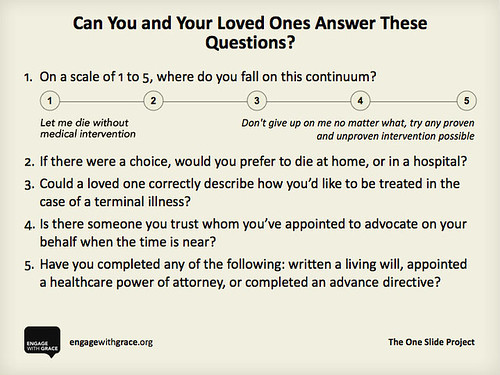Things we are grateful for this year
For three years running now, many of us bloggers have participated in what we’ve called a “blog rally” to promote Engage With Grace – a movement aimed at making sure all of us understand, communicate, and have honored our end-of-life wishes.
The rally is timed to coincide with a weekend when most of us are with the very people with whom we should be having these unbelievably important conversations – our closest friends and family.
At the heart of Engage With Grace are five questions designed to get the conversation about end-of-life started. We’ve included them at the end of this post. They’re not easy questions, but they are important -- and believe it or not, most people find they actually enjoy discussing their answers with loved ones. The key is having the conversation before it’s too late.
This past year has done so much to support our mission to get more and more people talking about their end-of-life wishes. We’ve heard stories with happy endings … and stories with endings that could’ve (and should’ve) been better. We’ve stared down political opposition. We’ve supported each other’s efforts. And we’ve helped make this a topic of national importance.
So in the spirit of the upcoming Thanksgiving weekend, we’d like to highlight some things for which we’re grateful.
Thank you to Atul Gawande for writing such a fiercely intelligent and compelling piece on “letting go”– it is a work of art, and a must read.
Thank you to whomever perpetuated the myth of “death panels” for putting a fine point on all the things we don’t stand for, and in the process, shining a light on the right we all have to live our lives with intent – right through to the end.
Thank you to TEDMED for letting us share our story and our vision.
And of course, thank you to everyone who has taken this topic so seriously, and to all who have done so much to spread the word, including sharing The One Slide.
We share our thanks with you, and we ask that you share this slide with your family, friends, and followers. Know the answers for yourself, know the answers for your loved ones, and appoint an advocate who can make sure those wishes get honored – it’s something we think you’ll be thankful for when it matters most.
Here’s to a holiday filled with joy – and as we engage in conversation with the ones we love, we engage with grace.
To learn more please go to www.engagewithgrace.org. This post was written by Alexandra Drane and the Engage With Grace team.

2 comments:
That was excellent. As someone who has been fortunate enough to have been given VERY unequivocal instructions from their parents about end of life issues, I can certainly appreciate the major difference even a little intervention like this makes.
One of my attendings mentioned something the other day which struck a chord. He said we should never refer to the decision as "aggressive treatment vs palliation" but rather "aggressive treatment vs aggressive palliation" because giving good palliative care, short or long term, requires a ton of monitoring and adjustment to optimize the outcomes.
You are definitely unique I think with regards to having knowledge of your parent's wishes. I sent an email to everyone in my family last year with my end of life instructions and invited them to do the same.
It definitely generated some good discussion and my sister-in-law emailed me afterwards saying how helpful the prompting had been---she and my brother had talked about all the other aspects of one of them dying (financial, raising the children, etc) but hadn't addressed those particular questions.
The Atul Gawande article is (IMHO) a masterpiece, it examines the issues both health care workers and family members face so eloquently. Worth a read if you haven't already. Similar vein to your attendings viewpoint.
If you want the HTML for your blog, shoot me an email.
Post a Comment